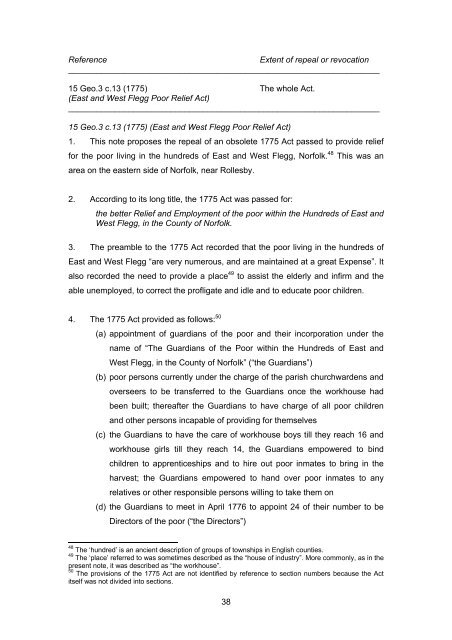Poor Relief - Law Commission
Poor Relief - Law Commission
Poor Relief - Law Commission
Create successful ePaper yourself
Turn your PDF publications into a flip-book with our unique Google optimized e-Paper software.
Reference Extent of repeal or revocation<br />
___________________________________________________________________<br />
15 Geo.3 c.13 (1775) The whole Act.<br />
(East and West Flegg <strong>Poor</strong> <strong>Relief</strong> Act)<br />
___________________________________________________________________<br />
15 Geo.3 c.13 (1775) (East and West Flegg <strong>Poor</strong> <strong>Relief</strong> Act)<br />
1. This note proposes the repeal of an obsolete 1775 Act passed to provide relief<br />
for the poor living in the hundreds of East and West Flegg, Norfolk. 48 This was an<br />
area on the eastern side of Norfolk, near Rollesby.<br />
2. According to its long title, the 1775 Act was passed for:<br />
the better <strong>Relief</strong> and Employment of the poor within the Hundreds of East and<br />
West Flegg, in the County of Norfolk.<br />
3. The preamble to the 1775 Act recorded that the poor living in the hundreds of<br />
East and West Flegg “are very numerous, and are maintained at a great Expense”. It<br />
also recorded the need to provide a place 49 to assist the elderly and infirm and the<br />
able unemployed, to correct the profligate and idle and to educate poor children.<br />
4. The 1775 Act provided as follows: 50<br />
(a) appointment of guardians of the poor and their incorporation under the<br />
name of “The Guardians of the <strong>Poor</strong> within the Hundreds of East and<br />
West Flegg, in the County of Norfolk” (“the Guardians”)<br />
(b) poor persons currently under the charge of the parish churchwardens and<br />
overseers to be transferred to the Guardians once the workhouse had<br />
been built; thereafter the Guardians to have charge of all poor children<br />
and other persons incapable of providing for themselves<br />
(c) the Guardians to have the care of workhouse boys till they reach 16 and<br />
workhouse girls till they reach 14, the Guardians empowered to bind<br />
children to apprenticeships and to hire out poor inmates to bring in the<br />
harvest; the Guardians empowered to hand over poor inmates to any<br />
relatives or other responsible persons willing to take them on<br />
(d) the Guardians to meet in April 1776 to appoint 24 of their number to be<br />
Directors of the poor (“the Directors”)<br />
48<br />
The ‘hundred’ is an ancient description of groups of townships in English counties.<br />
49<br />
The ‘place’ referred to was sometimes described as the “house of industry”. More commonly, as in the<br />
present note, it was described as “the workhouse”.<br />
50<br />
The provisions of the 1775 Act are not identified by reference to section numbers because the Act<br />
itself was not divided into sections.<br />
38
















